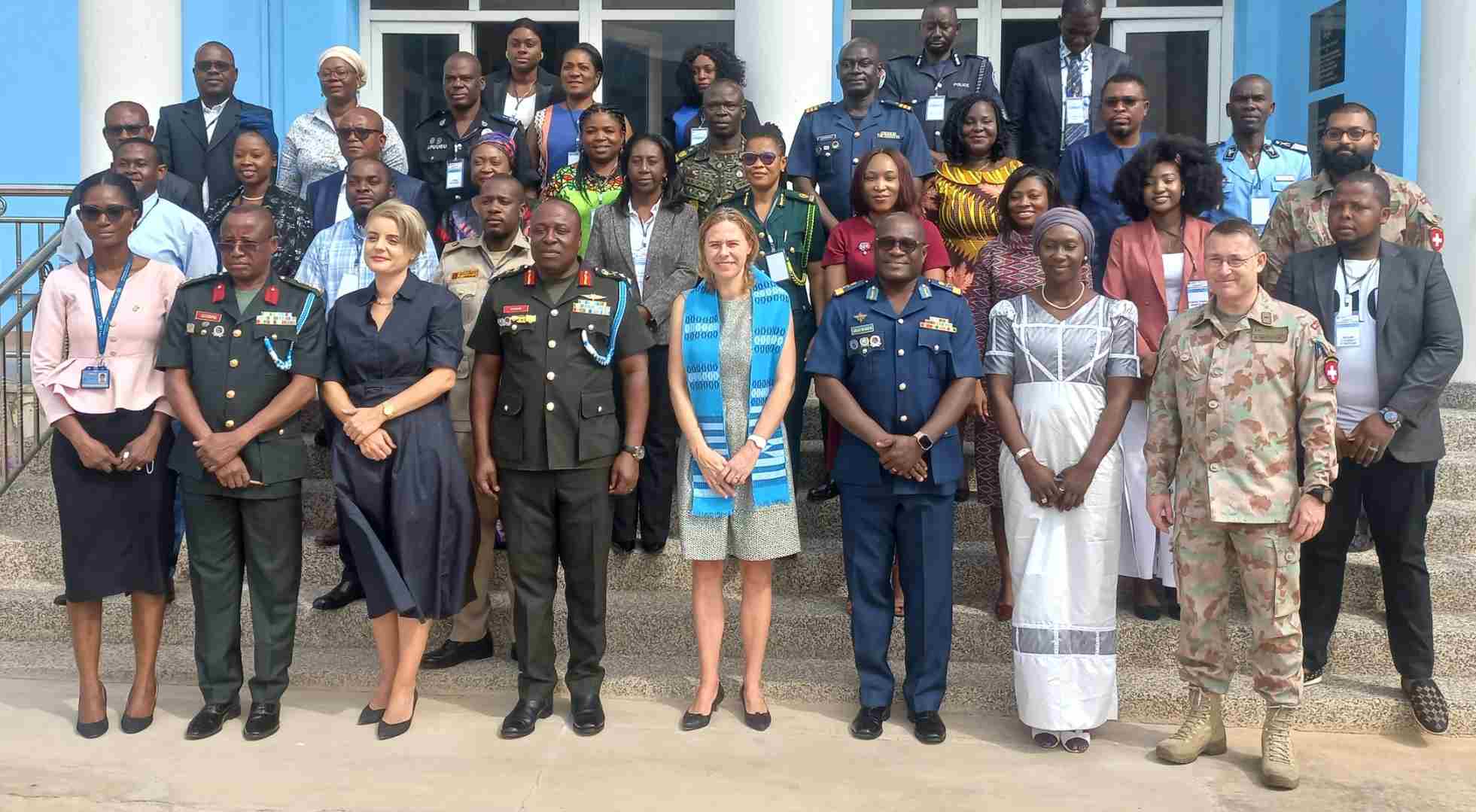The Kofi Annan International Peacekeeping Training Centre (KAIPTC), in partnership with the Swiss State Secretariat for Migration (SEM), has commenced West Africa’s maiden course on migration – Migration Management Course – for practitioners to be equipped with knowledge, tools and skills to contribute to improve policies and management.

The 10-day course for migration practitioners was opened on Monday, 23 January 2023, at the KAIPTC Centre of Excellence, Teshie, Accra, with the Guest-of-Honour being the Swiss Ambassador to Ghana – Her Excellency (HE) Simone Giger, and the Commandant, KAIPTC – Major General (Maj Gen) Richard Addo Gyane.
The Ambassador expressed delight in being part of the first edition of the first fully-fledged course on migration in the West African region, stating emphatically that migration cannot be tackled by any one country alone, for which reason, Switzerland encourages an international/cross-country approach, based on partnership and cooperation.
HE Giger also said the phenomenon of migration is not always negative, but can also mean new chances in the form of studies and work opportunities abroad, can encompass new beginnings, remittance flows, family reunions, and integration into countries of destination, thus, the training program should endeavour to deliver a comprehensive picture of the situation, with a special focus on the West African region.

She rounded up with a quote by the Former Secretary General of the United Nation – Kofi Annan – “Building higher fences cannot be the answer. Migration will continue until we lift the poorest and most vulnerable out of the conditions they are currently fleeing.”
General Addo Gyane, in a welcome speech, said the idea of the course conceived in 2020, is important as Africa continues to witness changing patterns of migration – a phenomenon that has become both dynamic and extremely complex.
The Army General furthered that contemporary migration issues, which are products of mass migration, displacement caused by poverty, violent conflicts, environmental stresses and a survival strategy, can contribute to economic growth and human development in both home and host countries, and enrich societies through cultural diversity, fostering understanding and respect among people, cultures and societies.
He continued that the challenge of managing migration has grown dramatically over the past few decades as more and more people are driven to move out of their homes, due to lack of infrastructure, legal frameworks and know-how, which hamper countries in the region in managing safe and legal migration, as answers are sought to stem irregular migration, while facilitating regular movements, and how to ensure state security, alongside protecting the human rights of migrants.

The Policy Advisor, international Cooperation Division of the State for Migration, Switzerland – Madam Gisela Schluep, in an interview with the press said her organization had been supporting migration courses for a long time, however, participants always moved to Europe to have such courses, hence they brooded the idea of locating the course at where the phenomenon starts from, so as to have a perspective of West and Central Africa Region and not the European vision, of the subject.
She hoped that the participants would end the training picking up new tools, with a broader, comprehensive knowledge of the subject that they can use in their daily work, and can impact their various countries for better migration management.
In response to a suggestion to have migrants as participants in the course, she said it would be considered subsequently for such persons to share their experiences to help practitioners formulate relevant policies that yield better results.
The 28-student Migration Course, which intends discussing migration, its challenges, the way forward, developing action plans and policies to effectively manage the migration process, will be delivered with the Collaborative Problem Based Learning (CPBL), through the use of lectures, participatory discussions, PowerPoint presentations, simulation, practical sessions/field exercise, for a course whose funding, including meals, accommodation and flights have been covered by SEM.
The training targets 28 participants from Ministries of Interior, Foreign Affairs/Diaspora Units, Youth, Employment, Immigration Services, Gender & Protection Units, Police Services, Academia, Non-Governmental Organizations from Ghana, Nigeria, Senegal, la Cote d’Ivoire, The Gambia, the African Union (AU) and the Economic Community of West African States (ECOWAS) Commission.
Training Objectives of the 2-week tuition are; 1) Improve participants’ understanding and knowledge on the causes of migration, and opportunities and challenges in migration, 2) Concepts and Terminologies/Typologies, 3) Trends and Patterns in Migration, 4) Root Causes, 5) Case Studies/Consequences (Impact), 6) Strengthen participants’ capacity and skills to apply human rights-based approach to migration, 7) Legal Framework, 8) Human Rights Based Approach.
Others are; 9) Protection of migrants, 10) Enhance participants knowledge and capacity to respond to issues arising in Migration management and security governance, 11) Irregular migration, 12) Border Management, 13) Transhumance, 14) Transnational Organized crime, 15) Integrating Gender into migration policies and migration management, 16) Gender Concepts, 17) Frameworks on Gender, and 18) Vulnerabilities and Protection Needs (Women, Children, IDPs, Youth, Migrant Workers) – SDG 10
Gender Mainstreaming.
Other dignitaries present at the opening ceremony were the Deputy Commandant, KAIPTC – Air Commodore George Arko-Dadzie, Director of Training – Colonel Anorph Barnabas Akanbong and
Course Director – Mrs Auguster Ahorsey.
By Kofi Ampeah-Woode
